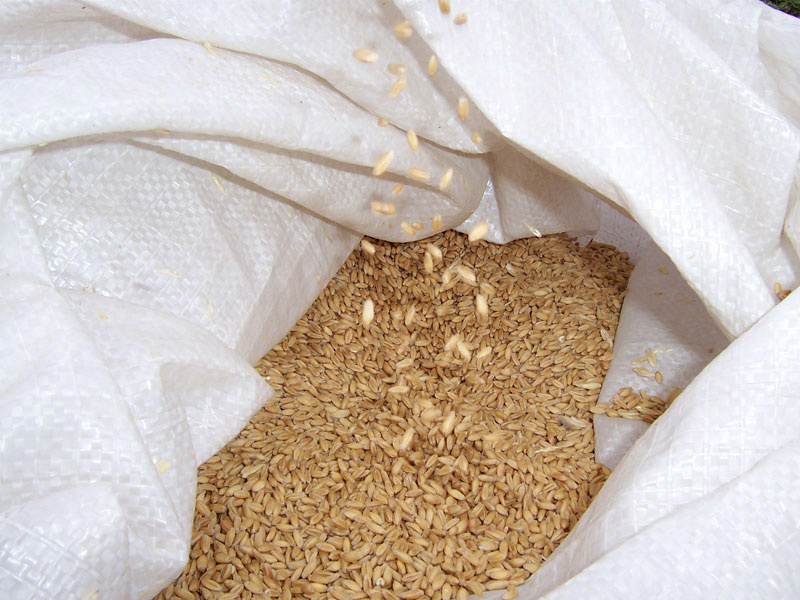
ALVIN JOHNSON looks at where the ‘chittah’, translated as wheat, appears in the Bible…
The word ‘chittah’, which is translated as ‘wheat’, is used 30 times in the Old Testament. Wheat (Triticum durum) was a very important crop in ancient Israel.
Deuteronomy 8:7-8 records seven products or species that are associated with the land of Israel. These were promised to the people of Israel prior to their entry into the country: “For the Lord your God is bringing you into a good land – a land with streams and pools of water, with springs flowing in the valleys and hills; a land with chittah (wheat) and barley, vines and fig trees, pomegranates, olive oil and honey.”

PICTURE: Bluemoose (licensed under CC BY-SA 3.0)
Wheat, like barley was sown in the autumn, around the month of October. Wheat takes approximately four months to harvest, which is a longer time to mature than barley. So the wheat harvest took place after the barley harvest. This is noted in Ruth 2:23: “So Ruth stayed close to the servant girls of Boaz to glean until the barley and wheat harvests were finished. And she lived with her mother-in-law.”
This difference in the time of the barley and wheat crops ripening was also seen in the plague of hail that destroyed some of the crops in Egypt, as seen in Exodus 9:31-32: “The flax and barley were destroyed, since the barley had headed and the flax was in bloom. The wheat and spelt, however, were not destroyed, because they ripen later.”
“The beginning of the wheat harvest was associated with the Feast of Weeks called Shavuot in Hebrew and known as Pentecost in the New Testament.”
The grain harvests were reliant on rainfall at the appropriate time. These rains were referred to in a promise to the people of Israel in the book of Deuteronomy (11:13-14): “So if you faithfully obey the commands I am giving you today – to love the Lord your God and to serve him with all your heart and with all your soul – then I will send rain on your land in its season, both autumn and spring rains, so that you may gather in your grain, new wine and oil.”
The early autumn rain which fell in September and October softened the ground so it was a suitable time for the farmer to plough his field and sow his seed. The spring rains fall in March and April and they are crucial for the maturing of both the barley and wheat crops. These rains are also referred to in Jeremiah 5:24 and Joel 2:24. They are also mentioned in the New Testament where James says, “Be patient, then, brothers, until the Lord’s coming. See how the farmer waits for the land to yield its valuable crop and how patient he is for the autumn and spring rains.” (James 5:7)
The beginning of the wheat harvest was associated with the Feast of Weeks called Shavuot in Hebrew and known as Pentecost in the New Testament: “Celebrate the Feast of Weeks with the firstfruits of the wheat harvest, and the Feast of Ingathering at the turn of the year.” – Exodus 34:22
The wheat harvest takes place in late spring, around the months of May and June.
In I Samuel 12:17 the Israelites were punished by having their wheat harvest destroyed by late storms. The prophet Samuel said to the people: “Is it not wheat harvest now? I will call upon the Lord to send thunder and rain. And you will realize what an evil thing you did in the eyes of the Lord when you asked for a king.”
Wheat was part of the staple diet of the Israelites.
“When David came to Mahanaim, Shobi son of Nahash from Rabbah of the Ammonites, and Makir son of Ammiel from Lo Debar, and Barzillai the Gileadite from Rogelim brought bedding and bowls and articles of pottery. They also brought wheat and barley, flour and roasted grain, beans and lentils, honey and curds, sheep, and cheese from cows’ milk for David and his people to eat. For they said, ‘The people have become hungry and tired and thirsty in the desert.” – II Samuel 17:27-29
Solomon included wheat as payment to King Hiram of Tyre, for his supply of material for construction of the Temple II Chronicles 1:15).
It was also a required payment of tribute after conflict. King Jotham of Judah ‘made war on the king of the Ammonites and conquered them: “That year the Ammonites paid him a hundred talents of silver, ten thousand cors of wheat and ten thousand cors of barley.” (II Chronicles 27:5)

Wheat grains. PICTURE: Via Wikipedia (licensed under CC BY-SA 3.0)
In Psalm 81: 13-16 God makes a promise to his people: “If my people would but listen to me, if Israel would follow my ways, how quickly would follow my ways, how quickly would I subdue their enemies and turn my hand against their foes!…you would be fed with the finest of chittah [wheat]; with honey from the rock I would satisfy you.” (See also Psalm 147:14)
Conversely, for disobedience the Israelites were warned that their crops such as wheat would suffer. Jeremiah warned “they will sow wheat but reap thorns” (Jeremiah 12:13).
The prophet Joel expressed a similar warning: “Despair, you farmers, wail, you vine growers; grieve for the wheat and the barley, because the harvest of the field is destroyed”. (Joel 1:11)
This is an edited excerpt from Alvin Johnson’s iBook ‘Biblical Flora’, 2017. The book is available for free download on iTunes. A teacher’s edition is also available for purchase.





